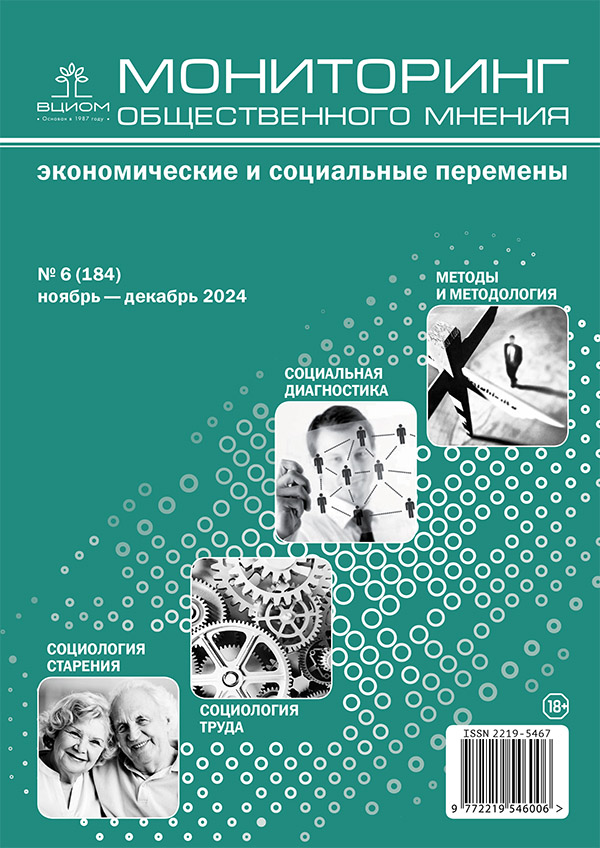Digital Forms of Employment in the Russian Labor Market. Part I. Distant Employment
DOI:
https://doi.org/10.14515/monitoring.2024.6.2654Keywords:
digitalization, distant employment, platform employment, labor market, labor force surveysAbstract
The paper analyzes digital forms of employment in the Russian labor market. The first part examines distant employment which gained widespread adoption in the 2020s in the labor markets of most countries. The authors examine the definitions of distant employment developed by international statistical organizations, the methodology for measuring it, and its prevalence in different countries. The coronavirus pandemic and the lockdowns introduced to combat it provided a strong impetus for this form of employment. The Russian labor market also experienced a sharp surge in distant employment during the coronavirus crisis.
A special section of the paper is devoted to the empirical analysis of the scale, dynamics, and socio-demographic profile of distant employment based on the microdata from the Rosstat Labor Force Survey for 2020—2023. A comparison of Russian experience with international one shows that the prevalence of distant employment in Russia is lower than in most developed countries. Over the period under consideration, it demonstrated a strong downward trend and currently accounts for just over 1%. Largely it remains a privilege of the most skilled part of the workforce (primarily those with higher education). The analysis shows that in Russian conditions, so-called standard employment is likely to remain the leading form of labor relations in the foreseeable future and that forecasts of its displacement by digital forms of employment are premature.
References
Забелина О. В., Мирзабалаева Ф. И. Социально-демографический профиль российской платформенной занятости // Лидерство и менеджмент. 2024. Т. 11. № 1. С. 407―421. https://doi.org/10.18334/lim.11.1.120152.
Zabelina O. V., Mirzabalaeva F. I. (2024) Socio-Demographic Profile of Russian Platform Employment. Leadership and Management. Vol. 11. No. 1. P. 407―421. https://doi.org/10.18334/lim.11.1.120152. (In Russ.)
Капелюшников Р. И. Российский рынок труда: статистический портрет на фоне кризисов: препринт WP3/2023/02 (Серия WP3 «Проблемы рынка труда»). М.: ИД ВШЭ, 2023.URL: https://wp.hse.ru/data/2023/05/16/2015545143/WP3_2023_02_____.pdf (дата обращения: 07.12.2024).
Kapeliushnikov R. I. (2023) The Russian Labor Market: A Statistical Portrait against the Background of Crises: Preprint WP3/2023/02 (WP3 Series “Problems of the Labor Market”). Moscow: HSE Publishing House. URL: https://wp.hse.ru/data/2023/05/16/2015545143/WP3_2023_02_____.pdf (accessed: 07.12.2024). (In Russ.)
Логинов Д. М., Лопатина М. В.Дистанционная занятость в период коронакризиса: масштабы распространения и результативность внедрения // Народонаселение. 2021. T. 24. № 4. С. 107―121. https://doi.org/10.19181/population.2021.24.4.9.
Loginov D. M., Lopatina M. V. (2021) Remote Employment in the Corona-Crisis Period: The Extent of Spread and Effectiveness of Introduction. Population. Vol. 24. No. 4. P. 107―121. https://doi.org/10.19181/population.2021.24.4.9. (In Russ.)
Ляшок В. Ю. Дистанционная занятость: удаленный режим в ряде профессий становится нормой // Экономическое развитие России. 2021. Т. 28. № 8. С. 63―67.
Lyashok V. (2021) Distance Employment: Remote-Working Mode Becomes the Norm in a Number of Professions. Russian Economic Developments. Vol. 28. No. 8. P. 63―67. (In Russ.)
Монусова Г. А. Работа дома и вне: условия труда и внерабочее время // Вопросы экономики. 2021. № 12. С. 118―138. https://doi.org/10.32609/0042-8736-2021-12-118-138.
Monusova G. A. (2021) Working at Home and Outside: Working Conditions and Non-Working Hours. Voprosy Ekonomiki. No. 12. P. 118―138. https://doi.org/10.32609/0042-8736-2021-12-118-138. (In Russ.)
Baimurzina G. R., Chernykh E. A.(2024) Platform Employment Specifics in Russia: What the Data of Workers’ Online Profiles Indicate. Economic and Social Changes: Facts, Trends, Forecast. Vol. 17. No. 2. P. 202―219. https://doi.org/10.15838/esc.2024.2.92.11.
Brynjolfsson E., Horton J. J., Makridis C., Mas A., Ozimek, A., Rock D., TuYe H.Y. (2023) How Many Americans Work Remotely? A Survey of Surveys and Their Measurement Issues. NBER. Working Paper No. 31193. URL: https://papers.ssrn.com/sol3/papers.cfm?abstract_id=4433872 (accessed: 07.12.2024).
Messenger J. C. (2023) Some Reflections on the Experience of Telework during the Covid-19 Pandemic: A Paradigm Shift and Its Implications for the World of Work. In: Countouris N., De Stefano V., Piasna A., Rainone S. (eds.) The Future of Remote Work. Brussels: ETUI Printshop. P. 19―27.
Milasi S., González-Vázquez I., Fernández-Macías E. (2021) Telework before the COVID- 19 Pandemic: Trends and Drivers of differences across the EU. OECD Productivity Working Papers. No. 21. Paris: OECD Publishing. https://doi.org/10.1787/d5e42dd1-en.
Piasna A., Zwysen W., Drahokoupil J. (2022) The Platform Economy in Europe: Results from the Second ETUI Internet and Platform Work Survey (IPWS). Research Paper-Working Paper No. 2022-5.Brussels: ETUI. URL: https://www.etui.org/sites/default/files/2022-02/The%20platform%20economy%20in%20Europe_2022.pdf (accessed: 07.12.2024).
Zwysen W. (2023) Remote Work as a New Dimension of Polarisation: Individual and Contextual Determinants of the Relationship between Working from Home and Job Quality. In: Countouris N., De Stefano V., Piasna A., Rainone S. (eds.) The Future of Remote Work. Brussels: ETUI Printshop. P. 83―102.
Downloads
Published
How to Cite
Issue
Section
License
Copyright (c) 2024 Monitoring of Public Opinion: Economic and Social Changes

This work is licensed under a Creative Commons Attribution-NonCommercial-ShareAlike 4.0 International License.






